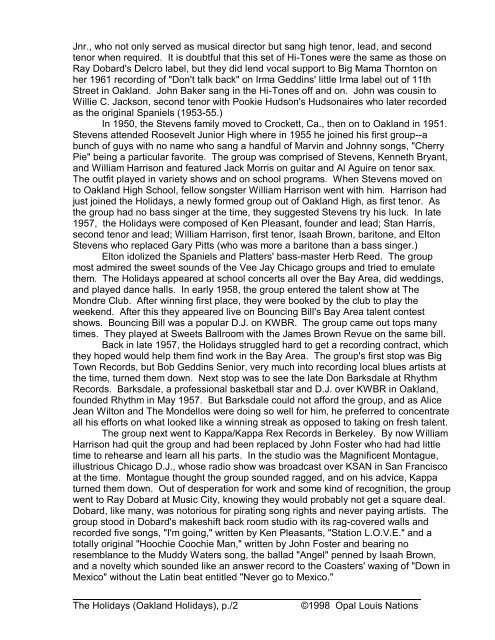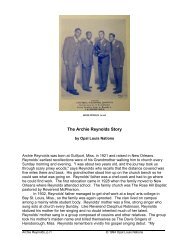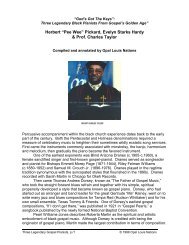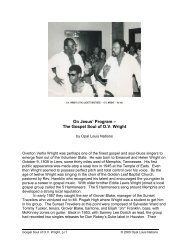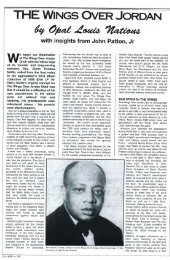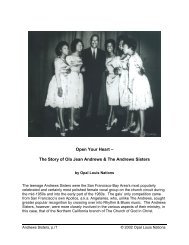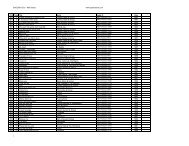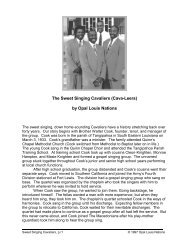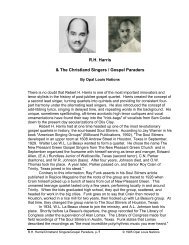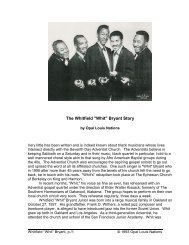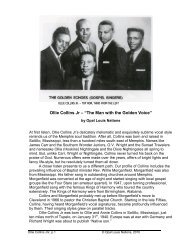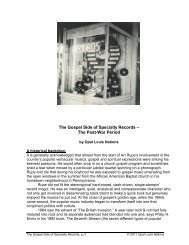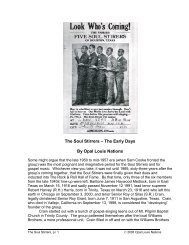The (Oakland) Holidays - Opal Louis Nations
The (Oakland) Holidays - Opal Louis Nations
The (Oakland) Holidays - Opal Louis Nations
You also want an ePaper? Increase the reach of your titles
YUMPU automatically turns print PDFs into web optimized ePapers that Google loves.
Jnr., who not only served as musical director but sang high tenor, lead, and second<br />
tenor when required. It is doubtful that this set of Hi-Tones were the same as those on<br />
Ray Dobard's Delcro label, but they did lend vocal support to Big Mama Thornton on<br />
her 1961 recording of "Don't talk back" on Irma Geddins' little Irma label out of 11th<br />
Street in <strong>Oakland</strong>. John Baker sang in the Hi-Tones off and on. John was cousin to<br />
Willie C. Jackson, second tenor with Pookie Hudson's Hudsonaires who later recorded<br />
as the original Spaniels (1953-55.)<br />
In 1950, the Stevens family moved to Crockett, Ca., then on to <strong>Oakland</strong> in 1951.<br />
Stevens attended Roosevelt Junior High where in 1955 he joined his first group--a<br />
bunch of guys with no name who sang a handful of Marvin and Johnny songs, "Cherry<br />
Pie" being a particular favorite. <strong>The</strong> group was comprised of Stevens, Kenneth Bryant,<br />
and William Harrison and featured Jack Morris on guitar and Al Aguire on tenor sax.<br />
<strong>The</strong> outfit played in variety shows and on school programs. When Stevens moved on<br />
to <strong>Oakland</strong> High School, fellow songster William Harrison went with him. Harrison had<br />
just joined the <strong>Holidays</strong>, a newly formed group out of <strong>Oakland</strong> High, as first tenor. As<br />
the group had no bass singer at the time, they suggested Stevens try his luck. In late<br />
1957, the <strong>Holidays</strong> were composed of Ken Pleasant, founder and lead; Stan Harris,<br />
second tenor and lead; William Harrison, first tenor, Isaah Brown, baritone, and Elton<br />
Stevens who replaced Gary Pitts (who was more a baritone than a bass singer.)<br />
Elton idolized the Spaniels and Platters' bass-master Herb Reed. <strong>The</strong> group<br />
most admired the sweet sounds of the Vee Jay Chicago groups and tried to emulate<br />
them. <strong>The</strong> <strong>Holidays</strong> appeared at school concerts all over the Bay Area, did weddings,<br />
and played dance halls. In early 1958, the group entered the talent show at <strong>The</strong><br />
Mondre Club. After winning first place, they were booked by the club to play the<br />
weekend. After this they appeared live on Bouncing Bill's Bay Area talent contest<br />
shows. Bouncing Bill was a popular D.J. on KWBR. <strong>The</strong> group came out tops many<br />
times. <strong>The</strong>y played at Sweets Ballroom with the James Brown Revue on the same bill.<br />
Back in late 1957, the <strong>Holidays</strong> struggled hard to get a recording contract, which<br />
they hoped would help them find work in the Bay Area. <strong>The</strong> group's first stop was Big<br />
Town Records, but Bob Geddins Senior, very much into recording local blues artists at<br />
the time, turned them down. Next stop was to see the late Don Barksdale at Rhythm<br />
Records. Barksdale, a professional basketball star and D.J. over KWBR in <strong>Oakland</strong>,<br />
founded Rhythm in May 1957. But Barksdale could not afford the group, and as Alice<br />
Jean Wilton and <strong>The</strong> Mondellos were doing so well for him, he preferred to concentrate<br />
all his efforts on what looked like a winning streak as opposed to taking on fresh talent.<br />
<strong>The</strong> group next went to Kappa/Kappa Rex Records in Berkeley. By now William<br />
Harrison had quit the group and had been replaced by John Foster who had had little<br />
time to rehearse and learn all his parts. In the studio was the Magnificent Montague,<br />
illustrious Chicago D.J., whose radio show was broadcast over KSAN in San Francisco<br />
at the time. Montague thought the group sounded ragged, and on his advice, Kappa<br />
turned them down. Out of desperation for work and some kind of recognition, the group<br />
went to Ray Dobard at Music City, knowing they would probably not get a square deal.<br />
Dobard, like many, was notorious for pirating song rights and never paying artists. <strong>The</strong><br />
group stood in Dobard's makeshift back room studio with its rag-covered walls and<br />
recorded five songs, "I'm going," written by Ken Pleasants, "Station L.O.V.E." and a<br />
totally original "Hoochie Coochie Man," written by John Foster and bearing no<br />
resemblance to the Muddy Waters song, the ballad "Angel" penned by Isaah Brown,<br />
and a novelty which sounded like an answer record to the Coasters' waxing of "Down in<br />
Mexico" without the Latin beat entitled "Never go to Mexico."<br />
________________________________________________________________<br />
<strong>The</strong> <strong>Holidays</strong> (<strong>Oakland</strong> <strong>Holidays</strong>), p./2<br />
©1998 <strong>Opal</strong> <strong>Louis</strong> <strong>Nations</strong>


